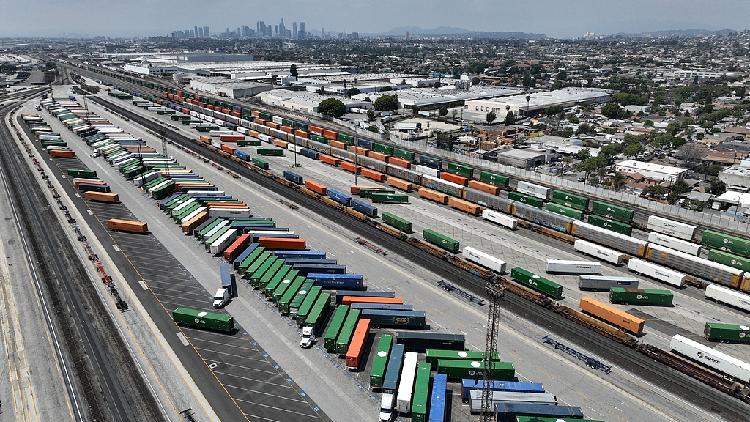Harris, Yellen, and Business Organizations Oppose Trump’s Tariffs
As U.S. President Donald Trump intensifies his tariff measures against key trading partners, a rising wave of dissent is emerging from various political and economic circles in the country. Critics, including former Vice President Kamala Harris,...

Harris delivered her first significant speech since being defeated by Trump in the 2024 presidential election in San Francisco on Wednesday. During her address, she characterized Trump's tariff strategy as "reckless," asserting that it has resulted in the "greatest man-made economic crisis in modern presidential history."
She remarked that the Trump administration and its supporters are "counting on the notion that fear can be contagious," and that they aim to instill fear in some individuals to create a chilling effect on others.
Harris contended that the tariffs imposed by the Trump administration have "hurt workers and families by raising the cost of everyday essentials" and are paralyzing "American businesses, large and small, forcing them to lay off people, to stop hiring or pause investment decisions."
She further stated that "the tariffs, as I predicted, are clearly inviting a recession."
'Increasing recession risk'
On April 2, Trump announced significant "reciprocal" tariffs on various countries, which sent shockwaves through the markets. Although he later paused most tariffs for 90 days, 145 percent duties on many Chinese goods remain. His tariff strategy has drawn widespread criticism, both domestically and internationally.
In an interview with the Financial Times on Thursday, Janet Yellen cautioned that Trump's extensive levies on trading partners could risk pushing the U.S. into recession.
Yellen, who previously chaired the Federal Reserve, stated that these tariffs "will have tremendously adverse consequences for the United States, for consumers, for the competitiveness of firms that rely on imported inputs." She highlighted that around 40 percent of goods imported into the country consist of inputs for domestic production.
While she refrained from officially predicting a recession, she acknowledged that "the odds have gone way up."
Yellen also emphasized that the tariffs could severely impact the U.S. clean energy sector, considering the country's "highly dependent on China for most of the critical minerals that go into clean energy technologies, batteries and the like." She remarked, "And by putting enormous tariffs on them, I think we potentially hobble industries that could have a chance."
States sue Trump administration
In April, California took the initiative to file a lawsuit challenging Trump's authority to unilaterally impose tariffs, declaring such actions unlawful and detrimental to the American economy.
Following this, a dozen states joined the lawsuit against the Trump administration's tariff policy. The states involved included Oregon, Arizona, Colorado, Connecticut, Delaware, Illinois, Maine, Minnesota, Nevada, New Mexico, New York, and Vermont.
Arizona Attorney General Kris Mayes described Trump's tariff scheme as "insane," asserting that it is "not only economically reckless. It is illegal."
While the legal battles may extend for months or even years, small businesses across the U.S. cannot afford to delay action.
On Wednesday, the U.S. Chamber of Commerce urged the Trump administration to immediately implement a "tariff exclusion process" aimed at preventing the economy from sliding into recession.
In a letter addressed to Treasury Secretary Scott Bessent, Commerce Secretary Howard Lutnick, and U.S. Trade Representative Jamieson Greer, the Chamber requested that trade officials promptly lift tariffs on all small business importers and products that "cannot be produced in the U.S."
The organization also called for a process allowing businesses to quickly obtain tariff exclusions when they can demonstrate that import duties represent "significant risks to U.S. employment."
In the letter, the Chamber's CEO, Suzanne Clark, expressed concern: "We are deeply concerned that even if it only takes weeks or months to reach agreements, many small businesses will suffer irreparable harm."
Hurting businesses around the world
Recently, the U.S. retail giant Amazon, which serves as a platform for small and medium-sized businesses, contemplated displaying the tariff portion of an item's price alongside its total listed price due to increased costs from tariffs. However, the plan was promptly abandoned after the White House targeted the company, with Trump personally reaching out to Amazon founder Jeff Bezos on Tuesday.
The increasing reliance on tariff barriers in the U.S. is causing significant economic disruption both domestically and globally, particularly in sectors linked to manufacturing and physical goods, such as retail and industrial materials.
These sectors are grappling with rising production costs, which not only dampen consumer demand but also diminish corporate profits, creating a perilous cycle that heightens unemployment risks and stifles global economic growth.
Ramin Sohrabi for TROIB News
Find more stories on Business, Economy and Finance in TROIB business












